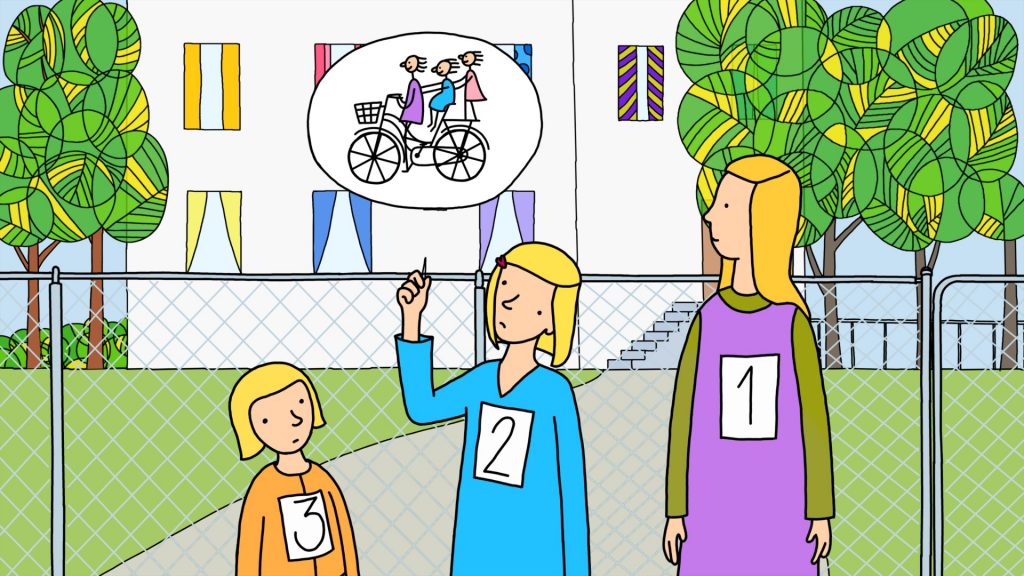Torill Kove is an award-winning director, animator, illustrator, and author. Born in Hamar, Norway, Kove lived in Kenya before moving to Montreal in 1982 to attend Concordia University. She went on to earn a master’s degree in Urban Planning at McGill University, then returned to Concordia to study animation, pursuing a lifelong passion for drawing and sketching.
She won Kodak Awards for her student films All You Can Eat, Fallen Angel, and Squash and Stretch. Kove also contributed to a number of animated productions for the National Film Board of Canada and illustrated seven picture books, three of which she authored as well. Her 1999 directorial debut for the NFB, My Grandmother Ironed the King’s Shirts (co-produced with Studio Magica in Oslo), was nominated for an Academy Award. Her next film for the NFB was The Danish Poet (a co-production with Norway’s Mikrofilm), featuring narration by Liv Ullmann. It won the Oscar for Best Animated Short in 2006, as well as a Genie Award. Both films were included in the Animation Show of Shows.
Kove made her feature film debut in 2013 with Hocus Pocus Alfie Atkins, based on the Alfie Atkins series by Gunilla Bergström. Her most recent NFB film, Me and My Moulton (2014, coproduced with Mikrofilm), recounts memories of growing up in a creative and unconventional family in 1960s Norway. (Press materials)
Me and My Moultron will play at the Toronto International Film Festival as part of the Short Cuts Canada Programme 6 on September 11 and 12.
WaH: Please give us your description of
the film playing.
TK: It
is a 14-minute animated short film. It is drawn in 2-D animation. The story
revolves around a 7-year-old girl who wishes her parents were not so
“different” from other parents.
WaH: What drew you to this story?
TK: I
wrote this story because I am interested in the loneliness and
isolation that we can feel when we hide feelings we are ashamed of,
especially if they concern people that we love. I am interested in the
complicated choreography of close relationships. In this story we see it
played out, both with the protagonist and her parents and with her
friend. On the surface the story is about wanting a regular bike, but
getting a really strange one instead. But ultimately, the film isn’t just
about the bike.
WaH: What was the biggest challenge in
making the film?
TK: The fictionalization of real events. I was very afraid that
people would be hurt or offended. I think I will be very hesitant in the
future to make references to real people.
WaH: What do you want people to think
about when they are leaving the theatre?
TK: I
would like them to think about parent-child relationships, about how
incredibly smart and insightful young children can be about family
dynamics. I would also like people to see the humor in the perception
many of us have of feeling different from others. My parents told me
they knew they made lots of mistakes raising us, but that they did their
best. Most parents will say something like that at some point, and they
are usually right. But I think children also do their best while being
raised. Finding family “happiness” is a fine balancing act.
WaH: What advice do you have for other
female directors?
TK: Don’t
listen to other people’s advice unless it is rooted in irrepressible
enthusiasm (e.g., “Be afraid but do it anyway”), or about the importance of
being a good colleague.
WaH: What’s the biggest misconception
about you and your work?
TK: Not sure there are any, at least not that I know of. Some may think my style is really easy, because it is so simple.
WaH: How did you get your film funded?
TK: It
was a co-production, and it was funded by various Norwegian funding
agencies as well as the National Film Board of Canada. It is my third
film with this kind of co-production financing. Both Norway and Canada
have funding possibilities for animated shorts, for which I am very
grateful.







